Peter MALONE
Saturday, 18 September 2021 19:27
Babycakes
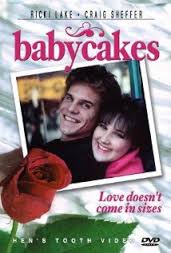
BABYCAKES
US, 1989, 100 minutes, Colour.
Rikki Lake, Craig Sheffer, Betty Buckley.
Directed by Paul Schneider.
Babycakes is a cheerful telemovie capitalising on the literally large talent of Ricki Lake, the star of John Waters' Hairspray. It is based on the successful German film, Sugar Baby, written and directed by Percy Adlon.
The film focuses on Grace who works in a mortuary, her girlfriend, her desire for a relationship ignoring the fact that she is large. Craig Sheffer (That Was Then, This Is Now) is the object of her admiration. There are emotional tangles, commitment and infidelity and Grace's having to learn how to cope.
1. Enjoyable comedy? Focus on youth? Problems?
2. American telemovie style: the city, the funeral parlour, the family? Subway sequences? The ordinariness? Musical score?
3. The title and the German Sugar Baby?
4. The focus on Grace as a personality, her cheerfulness, size? Sharing with her friend? Her work at the funeral parlour, the various corpses and preparing them? The relatives? The manager and getting time off? Her relationship with her father, clash with her stepmother? The children? Preparations for the wedding, her not being allowed to be a bridesmaid? Trying on clothes and being moved off? Seeing Rob and the skating, contriving to meet him, her pushiness? The date, his drinking and her taking care of him, his forgetting? The beginning of the affair, the bonds between the two? Sharing? His failure? Grace's girlfriend being jealous? Rob's girlfriend coming back? Grace's friend betraying her? The confrontation? Grace as sad but more realistic? Meeting Rob in the subway?
5. Ricki Lake and her personality, comedy about her size, nice and pleasant? Appearances not mattering?
6. Her friend, sharing friendship with her, confidences, the funeral parlour, excited about the date? With Rob? Jealousy of Grace? Telling Rob's girlfriend?
7. Rob and his appearance, charm, skating, work, buddies? Chance meeting of Grace? The date? Passing out and Grace looking after him? The affair, the effect on him? his girlfriend and her return, her demands? Fight, seeing Grace again?
8. Rob's girlfriend, relationship, being away, the return, the confrontation?
9. The funeral parlour, the bodies being prepared? Relatives? The boss?
10. Grace's father and his relationship to her? Marrying the stepmother? The shunning of Grace, the wedding and the insult? Grace taking Rob for a meal and their attention?
11. Sketch of society, expectations? Relationships and love? Commitment, hurt, having to cope?
Published in Movie Reviews
Published in
Movie Reviews
Tagged under
Saturday, 18 September 2021 19:27
Baby Boom
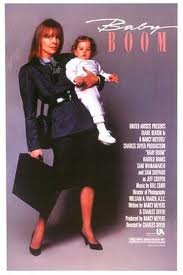
BABY BOOM
US, 1987, 110 minutes, Colour.
Diane Keaton, Sam Shepard, Harold Ramis, Sam Wanamaker, James Spader.
Directed by Charles Shyer.
Baby Boom is a star vehicle for Diane Keaton. She is a successful businesswoman as well as surrogate mother. It is a bit lighter than the usual films associated with Keaton.
The film also fits into the preoccupation with babies in 1987-88, especially with Three Men and a Baby and She's Going To Have A Baby. Keaton would work with Charles Shyer in the 1990s in the two Father of the Bride films. The film was co-written with Nancy Meyers, Shyer’s then wife. Meyers later directed What a Woman Wants and Somethings Gotta Give.
The film has a good cast, is stronger comedy with more social comment than Three Men and a Baby. However, it relies on the American Dream, romance, feminism and the ever-cute children.
1. The popularity of babies in films in the late 1980s? Comedy, cute? Focus on life, relationships and values? Positive outlook?
2. The world of New York, the city and the skyline, streets, busy? Business and management? The world of wealth and restaurants? The contrast with the simple town in Vermont, the beautiful Vermont countryside? The seasons? Musical score and songs?
3. The title and its focus? Humour?
4. The introduction and the feminist commentary: business, women's achievement? In relationship to what happened to J.C.?
5. New York and women, J.C.Wyatt and her successful work, her relationship to Fritz, her relationship to Ken? Her work, workaholic? The number of accounts? On the phone? Dedicated to her job? offered the partnership and her legs shaking? The conditions and her fulfilling them? Her relationship with Steven, their living together. the work in bed, the two phones, the four-minute sex? Back to work? All set for her career?
6. The phone call, her uncertainty, going to the airport, signing the document, getting Elizabeth? Taking her, the awkward handling her like baggage? At the restaurant and her embarrassment with the crying? Trying to make a deal? The failure of the partnership? Ken and his coming up, the early meetings and her absence, ambitions, her decision to leave?
7. The cuteness of the baby, Steven coming home and his shock, their playing, talking, throwing the spaghetti and cleaning up, the baby's cough, J.C. on a buying spree?
8. The question of adoption, the prospective parents and the audience's dislike of their attitude, J.C's deciding to take her? The interviews with the variety of nannies - and the comedy of their attitudes? Her fear of Helga kidnapping? Eve and her innocence and the sex with the boy and her being ousted? Going to Cleveland, the phone call in the middle of the meeting?
9. J.C. and the home in Vermont, her hopes, buying the house, going to the country, the barn, milking the cow, the apples? Making the sauce? The house as a disaster, the plumbing, the snow, the roof, the electricity? The electrician and his coming - his laconic attitudes and quotes for money?
10. Her fainting, her pouring out her heart to Jeff Cooper, discovering he was a vet, her embarrassment, antagonism towards him? Meeting him in the library?
11. The baby food, its being sold, her studying up methods, going on tour, the great success, the phone call from Fritz, the meeting with the Board, the man from Cleveland? Their persuasion, arguments, her decision not to sell?
12. The relationship with Jeff, his kissing her, the punctured tyre and his help, the dance, the relationship, her decisions? Her devotion to Elizabeth?
13. The happy ending and success - J.C. having everything: the fulfilment of the American Dream?
14. J.C. looking after Elizabeth, going to the park and listening to the mothers booking their children into kindergartens and schools, taking Elizabeth to the classes for advancing the children and the comedy with the bars and rings, the athletics, the cards of knowledge for the children to learn?
15. Themes of the '80s, Diane Keaton vehicle, comic style - romantic and cute?
Published in Movie Reviews
Published in
Movie Reviews
Tagged under
Saturday, 18 September 2021 19:27
Breed Apart, A
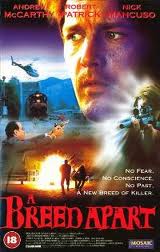
A BREED APART
US, 1984, 95 minutes, Colour.
Rutger Hauer, Powers Boothe, Kathleen Turner, Donald Pleasence.
Directed by Philippe Mora.
A Breed Apart is an environmental thriller, coming in the early 80s, early enough in the campaign for ecological consciousness that was so prevalent by the end of the decade. The film was made in North Carolina, focusing on the backwoods, the protected species on islands and rivers in that state. It focuses on people involved in the preservation of the environment, ordinary people who take sides in favour of the environment, collectors who are predators on ecology and dying species. There is also an attack on the media and its exploitation.
The film was directed by Philip Mora, the Australian director whose credits include Mad Dog Morgan, The Beast Within, Communion, Howling Two, Death of a Soldier. The star is Rutger Hauer, the Dutch actor who went to Hollywood in the early 90s and starred in such films as Nighthawks, Blade Runner, The Hitcher. Powers Booth is the mountain climber who is, employed by Donald Pleasance to steal eggs of an almost extinct species of eagle. It is interesting to see Kathleen Turner in the feminine lead, after her work in such films as Body Heat, but before the peak in her career with Prizzi's Honour.
1. An ecological thriller? The environment? Violence and intrusion on the environment?
2. The North Carolina locations, the small town, the river, the island? The focus on the beauty of nature, the species, the flight of the eagle, the nest? Action sequences and editing, stunts? the musical Score?
3. The title, the reference to small species and their survival, the focus on Jim and his living apart after his Vietnam experience? The relationship of Jim to nature?
4. The atmosphere of North Carolina, the backwoodsmen and their hunting, their making a living? The special types, the breed apart who looked after the environment? The beauty of the surroundings? The appeal to the audience for the preservation of the environment?
5. Jim, the mystery man on the island, the owner? His work with the birds, preservation? The snake and the cages of birds? the eagles on the mountain and the protection of the eggs? his strange behaviour? The confrontation with the hunters, his shooting the arrow? Their enmity, their attack on him later and the violent battle, deaths? His relationship with Stella and Adam, Adam idolising hint? His resistance to Stella and her advances? The memories of his wife and child? Intimations of something strange? The encounter with Michael Walker, friendship, discussions about nature, giving him the fish, talking, friendship and, trust? His response to Stella. Friendship, looking at the campsite, helping him to reconcile with Stella - but using him for the opportunity to scale the mountain? With Stella, the passionate encounter? His sense of something wrong, the riding the horse, pursuing Mike, shooting? The reconciliation between the two? the media and their interrogations and being pushed into the water by Adam? A new beginning?
6. Whittier and his eccentricities, the recluse, his bald head (and the symbolism of eggs - and his having the egg for breakfast)? His collection, its illegality, the proposal to Michael Walker, persuading with the money? The phone calls and his pressure, raising the price? His failing, left alone with the egg, his collection, the threat of the expose on television? His symbolising the exploiters of the environment for their own selfish vanity?
7. Michael Walker, his mountain-climbing and training, the media, ambitions for China, wanting the money, invited by Whittier, listening to the proposal, lack of scruple, the money? Arrival, the clash with Stella? Reconciliation, dinner with her? Going to the island, being warned, the encounter with Jim, friendship, discussion of the environment? Staying, understanding him, not telling him the truth? Leading him on about Stella, the reconciliation and urging him to go to her? The attack by the woodsman, the fight and his helping Jim? The scaling of the mountain, seeing the eggs, listening to Whittier's voice, the decision to leave them there, photograph them only? Jim's attack, the fall into the water, the rescue? His taking the honourable stand? The encounter with the TV reporter, the sexual encounter, his not giving her information? Meeting her at the end, offering her an exclusive?
8. Stella and Adam, running the store, mother and son, love, clashes? Attachment to Jim, his resistance? Her reaction to Adam's driving the car? Meeting Mike, stern after the clash with Adam? The woodsmen and their fight with Jim in the store and their destructiveness, Jim paying? The dinner with Mike, his advances, on the couch? Her going to the island with Adam, the bad reception and their return, the reconciliation, the passionate encounter? A future with Jim?
9. The reporter, her attitudes, the encounter, the interview, into the water, her sense of humour, meeting Mike and getting the exclusive about Whittier?
10. The backwoodsmen, hunting, the character of the hunters and their brutality, killing the birds at random, then collecting them and burning them? Attacked by Jim, shot? Their coming, the attack on the island, being outwitted, accidentally killing one another?
11. The blend of serious ecological themes with the violent outdoor action film, the backwoods vengeance film? How well did they combine for audience entertainment? For communicating the environmental message?
Published in Movie Reviews
Published in
Movie Reviews
Tagged under
Saturday, 18 September 2021 19:27
Border River
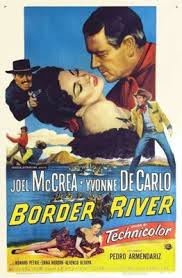
BORDER RIVER
US, 1954, 80 minutes, Colour.
Joel Mc Crea, Yvonne de Carlo, Pedro Amandariz.
Directed by George Sherman.
Border River is one of the Many westerns turned out by Universal Studios during the 50s. Though often B-budget and released as supporting features. However, they were well made in their style, straightforward - and still have quite an appeal (often more so than some of the stylised films of the period which are now dated). Stars were often Joel Mc Crea, Audie Murphy, Rory Calhoun. This is a Joel Mc Crea feature and he is paired with Yvonne de Carlo who was often featured in films like this. The setting is the end of the Civil War, the Zona Libre on the Mexican border and intrigue for using gold to buy arms for the confederates at the end of the war.
It is competent entertainment in the Universal style.
1. Entertaining western? Civil war? The American/Mexican border?
2. Colour photography, locations and atmosphere? Musical Score? The stars?
3. The title, the Zona Libre, the border river? Mexico and the United States?
4. Joel Mc Crae as Clete, the strong taciturn hero, his presence in the Zona Libre, the information about him and his place in the confederate army? The gold? The pursuit, the arrival, making friends in the town, attraction towards Carmelita? Contact with the general, with Vargas? With the German arms merchant? Plans, the gold, his contacts from the confederates? The Pinkerton detective and his trying to unmask him? Complications, riding to the gold, hiding the gold, Vargas's pursuit and his death? The burial? Tactics, final confrontation, the getting of the gold? Carmelita going with him? The typical western hero?
5. Carmelita, her place in the town, relationship with the general? Attraction towards Clete? Trying to be independent, giving warnings? The pursuit of the gold? The General and clash with her? The confrontation, the rescue, a future with Clete?
6. The general, Mexican government, The United States and the Civil War? The Zona Libre and his authority? Spies? Arms deals, gold and money? Permitting the Americans to come? The lawlessness of the town? Vargas as his subordinate? Greedy, the gold, Vargas's death? The general and the betrayals? death of the German? The confrontation with Clete?
7. The confederates, contacts with Clete, the bringing of the gold and concealing it? Motivation for the ending of the war? The contrast with the Pinkerton detective and his employment by the North? His being bettered by Clete?
8. A blend of politics, the lawlessness of the border towns, exotic romance, the civil war?
Published in Movie Reviews
Published in
Movie Reviews
Tagged under
Saturday, 18 September 2021 19:27
Bloodbath / Las Flores Del Vicio
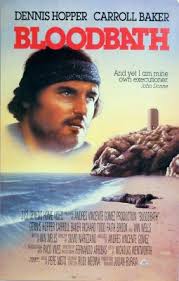
BLOODBATH (LAS FLORES DEL VICIO)
Spain, 1979, 90 minutes, Colour.
Dennis Hopper, Carrol Baker, Faith Brook, Richard Todd.
Directed by Silvio Narrizzano.
Bloodbath is the overwrought title of a rather overwrought film. It is a story of decadence, patriots in a Spanish speaking coastal town - where the inhabitants seem to spend their time playing up to the expatriates or involved in religious processions. The film is a blend of the real and surreal.
Dennis Hopper is a drug addict, often in a drugged stupor, relating to the expatriate group as well as playing up to young women in the town. Carol Baker portrays a faded a film star - with much of the dialogue seeming to echo her own career in Hollywood and in Europe. It all seems a rather humiliating role for her to take on). Richard Todd and Faith Brook portray an English couple, he a World War II commander (just like his many films) and he is still living in the past. She is an alcoholic. There is an American eyeing the men of the town - many of whom seem readily available for him or a black woman (played by Win Wells who wrote the screenplay). The film is a mixture of the surreal, the sensational and the sleazy. However, in the print under review, there is very little of any explicit bloodbath, even though everybody is attacked by the villagers at the end. The film is directed by Silvio Narrizzano, director of Georgy Girl.
1. Impact of the film? Bizarre story, plot, treatment?
2. The coastal setting, the town, the beach? Night and day, light and darkness? Special effects and editing - for the experiences of the protagonists? Musical score, songs, religious hymns?
3. The title - appropriate, sensational?
4. Chicken and his drug addiction, Dennis Hopper playing something of a character akin to his past experiences? In the town, with the black woman, socialising, the drugs, sexual encounter with the young girl, collapsed on the beach? His memories - the revivalists, his mother, interchanging the girl with his mother in his fantasies? His career, the young boy, sexuality, protest and drugs? The explanation of his derelict behaviour? The final destruction?
5. Treasure and Carroll Baker's style, in the car drinking with the man on the beach, her house, living in the past, the casting couch and her stories (and the interchange in her fantasies)? Her career, floundering, wanting the phone to ring? The men in her life? Sexuality and decadence? The fiesta? The final attack of the men, the phone, her drowning?
6. The homosexual, his career, attracted to the men, seductions, resistance? His flippant style of communication? With the group? Taking the black man home, the encounter - and his death? The brutality of his death?
7. The English couple - the World War II commander, stiff upper lip, memories of the past, the flashbacks to the war sequences? At the fiesta, with his wife, her drunkenness? With the young girl and his advances? his wife, drinking, bewilderment at what was going on?
8. The men of the village, their availability to the expatriates? The ultimate vengeance?
9. The people in the village, their religions processions and rituals, observing the expatriates?
10. The fiesta? The antagonism? The children, exploited, the young boy crushed to death? The mysterious nature of the village, the villagers, and their attitudes towards the people in their midst?
11. The overall impact of this film - how much point? How pointless?
Published in Movie Reviews
Published in
Movie Reviews
Tagged under
Saturday, 18 September 2021 19:27
Bird of Paradise

BIRD OF PARADISE
US, 1951, 100 minutes, Colour.
Debra Paget, Louis Jourdan, Jeff Chandler, Everett Sloane, Jack Elam.
Directed by Delmer Daves.
Bird of Paradise is a colourful remake of the 1932 film by King Vidor with Joel Mc Crea and Delores del Rio. The film was made on location in the Hawaiian Islands and purports to offer customs and dances and rituals authentically researched.
Jon Hall made this kind of film in the 30s as did Dorothy Lamour in her sarong adventures, so popular in-the late 30s and early 40s at Paramount studios. (She and Hall appeared together in John Ford's Hurricane.)
Louis Jourdan is the hero, a Frenchman who goes to the Islands and finds true love and the meaning of life. Debra Paget is the island princess who falls in love with him but who sacrifices herself to tee volcano for the sake of the island people (the kind of material parodied, not so effectively, by Meg Ryan and Tom Hanks in John Patrick Shanly's Joe versus the Volcano). Jeff Chandler is the island prince.
The film was written and directed by Delmer Daves who made a number of Warner Bros. romantic dramas in the 40s and is noted for his romantic melodramas of the 60s including Susan Slade, A Summer Place. During the 50s he made a number of westerns which focused on racial prejudice. Broken Arrow was a break-through western (starring Debra Paget and Jeff Chandler). Race issues are also presented in this film (with Jack Elam a particularly obnoxious racist.)
1. Colourful island melodrama? Romance?
2. Authentic Hawaiian locations? The sea and the islands? The authentically researched traditions? The musical score?
3. The title, the focus, the Pacific islands considered paradise? The inhabitants and their idyllic existence? The contrast with their beliefs, superstitions, religion, destruction?
4. The themes of racial prejudice and the convict and his vitriolic attack on the Kanakas? Sailing on the boat? The reaction of Andre, of Tenga? The passengers? The background of Tenga and white settlers marrying islanders?
5. Andre, the Frenchman befriending Tenga in the U.S., coming for a holiday, lack of racial prejudice? On the boat, to the island, swimming ashore, the witchdoctor and his warnings? The chief and his accepting Andre? Friendship with Tenga and life on the island? Idyllic? Hunting, swimming? preparing to receive the Mana? The love for the princess, her talking to him, the witchdoctor and the bad omens? The favourable omens? Tenga sending Andre to the island, his encounter with the
sailor, the sailors children, his bitter story and exile? The sailors return to the island and his being killed? The traditions for the marriage, the ceremony, the Princess choosing Andre, the ritual kidnapping; the marriage? No children? The possibility of a second wife, and Andre's handling the situation? The volcano, the eruption, the princess sacrificing herself, Andre's grief? his final words leaving the island?
6. Tenga, the prince, education in the West, returning home? Vigorous, hunting, the customs? Helping Andre? Helping bin with his parents? The gifts? Knowing that the princess had spoken to him? Arranging the marriage? Traditions, the sacrifice?
7. The princess, attracted to Andre, speaking to him, the silences? Going to the witch doctor, the omens? The choice, the kidnapping, the ceremony? No children, offering the second wife? The decision to sacrifice herself for the islanders, throwing herself into the volcano?
8. The sailor on the island, his history, bitterness, children, death, warning to Andre?
9. The witch doctor, the omens, threats? The confrontation with the King? The volcano and the sacrifice?
10. The King and his wife, traditions, rule over the islanders, over the witch doctor?
11. Popular sarong movies of the 40s and 50s? The exotic islands? Romance? underlying racial themes?
Published in Movie Reviews
Published in
Movie Reviews
Tagged under
Saturday, 18 September 2021 19:27
Bolero
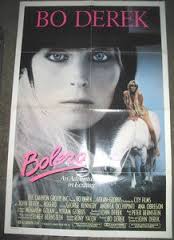
BOLERO
US, 1985, 104 minutes, Colour.
Bo Derek, George Kennedy.
Directed by John Derek.
Bolero is a sex fantasy comedy, designed by John and Bo Derek to exploit Bo Derek. It generally does - but, apparently, not sufficiently for it to become a box office hit.
The film has its tongue in cheek. Bo Derek takes the proceedings not entirely seriously - though perhaps John Derek, her husband, behind the camera, does. (And one wonders about an elderly husband exploiting his glamorous wife in this way - as director and photographer.)
The film is a corny sex fantasy, set in the 20s and the period of Valentino, parodying the Valentino films. Bo is at finishing school in England and travels to Africa. She encounters a reluctant sheikh, is kidnapped and then goes to Spain where she has a semi-torrid affair with a bullfighter. All this is under the eye of, of all people, George Kennedy as her guardian chauffeur. There are some sex scenes. Bo is exploited. However, the screenplay is fairly silly, geared as a fantasy - and obviously not to be taken too seriously. Critics and the public did not.
Published in Movie Reviews
Published in
Movie Reviews
Tagged under
Saturday, 18 September 2021 19:27
Bloodhounds of Broadway
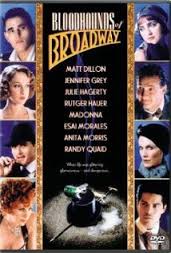
BLOODHOUNDS OF BROADWAY
US, 1989, 93 minutes, Colour.
Josef Sommer, Madonna, Tony Azito, Jennifer Grey, Rutger Hauer, Matt Dillon, Stephen Mc Hattie, Julie Hagerty, Anita Morris, Randy Quaid, Alan Ruck.
Directed by Howard Brookner.
Bloodhounds of Broadway is based on Damon Runyon's stories - echoes of Little Miss Marker, Guys and Dolls, Pocketful of Miracles. The recreation of New Year's Eve, 1928, is done with great attention to detail.
The film was directed and co-written by Howard Brookner, a documentary film maker. He died before the film was released.
The film has a very strong cast - however, the film is brief, and they are able to give only cameo performances. In fact, while the atmosphere of Damon Runyon is there, the film seems peculiarly paced - at times too slow in action, at times too fast with the multiplicity of characters and plots. The success of the film will probably depend on the mood of the audience.
1. The popularity of Damon Runyon's stories? New York stories and eccentrics? Guys and Dolls? Prohibition, night clubs, gambling? The down and out, the rich?
2. The recreation of the period: New York and Broadway, the speakeasies and the restaurants, the homes and the streets? Decor? Costumes? The musical score? The songs?
3. The title and its tone? The actual bloodhounds and the murder investigation? The people and the way that they were characterized?
4. The complexity of the plot? The various subplots? Interwoven? The voice over by the journalist? His perspective on things? Audience ability to follow the characters, the plots? The blend of the serious and the humorous?
5. The focus on the Brain and Regret? At the restaurant? Their friendships? The Brain and his henchmen, his bodyguard? The man about town, the attack on him by Red, the stabbing? His going to his various girlfriends and their turning him away? Widow Mary and his giving her the money for the rose? Her taking him in? Caring for him? His death? The reaction of the bodyguard? Widow Mary and her kindness?
6. Regret, his gambling, his only success? The man about town? His love for Lovey Lou? The interactions with her? His looking at other women? Her disappointment in him? The attack and the shooting? His being blamed? The Bloodhounds tracking him down? Lovey Lou and her shooting of the man who insulted her and her sister? Defending Regret? The happy ending?
7. Feet and his friendship with Regret? His giving his body to the Doctor? His big feet and their help for Science? His infatuation with Hortense Hathaway? Around the speakeasies discussions with the journalist? His playing and gambling, winning the jewellery? Giving it to Hortense? Her attraction towards him? Her song and dance routines? Her not wanting the jewellery but wanting security and business? The plan for them to get married? Hortense Hathaway and her performances in the chorus?
8. Harriet MacKyle?, the society woman, hanging around with the gamblers, with handsome Jack? With Basil Ballantyne? Going to her own apartment, her party and all the guests? Her parrot and the shooting of the parrot? Basil Ballantyne as a wimp, his love for Harriet? His getting the gun, the setup with handsome Jack? The threat to shoot him? Red giving him the gun - with real bullets? The confrontation, the shooting, Lovey Lou being wounded? Harriet and Basil going on the lam to the Riviera?
9. Handsome Jack and his Associates, hanging around the speakeasy, his presuming he is the man about town? The party, anger, shooting of the parrot? The confrontation with Basil and the plan?
10. The journalist. his observations about the situation, writing up his articles? The difficulties with the police, the murder, the Bloodhounds, the searching out of the culprit? His continuing to observe - the Runyon point of view?
11. Next Lovey Lou, her being around the speakeasies, the insult to her family, her love for Regret, her feeling betrayed, his laying himself down for her, the happy reconciliation?
12. Miss Missouri and the speakeasy, managing people, her verve, vitality, her song and dance routines?
13. The picture of life in the speakeasies? The violence and fights - the shooting - and the man not dead? The stabbing and Brain dying?
14. A blend of the oddball, the eccentric, the New York tradition? Runyon's perspective on eccentric human beings?
Published in Movie Reviews
Published in
Movie Reviews
Tagged under
Saturday, 18 September 2021 19:27
Barry McKenzie Holds His Own
BARRY McKENZIE HOLDS HIS OWN
Australia, 1974, 93 minutes, Colour.
Barry Crocker, Barry Humphries, Donald Pleasence, Dick Bentley, Nell Campbell, Chantal Contouri, Ed Devereaux.
Directed by Bruce Beresford.
Barry McKenzie? Holds His own: more money, more energy, more guest stars, more locations have gone into this sequel. But the tone and style are just the same and you will quickly know where you stand. Barry Crocker's Barry is the same naive, Fosters-swilling, big-hatted, sex-preoccupied, Aussie vulgar-mouthed innocent abroad, a comic strip sketch of a hero. Barry Humphries as Mrs Everage is excellent (also as the minister for Media). Dashes of horror (via Donald Pleasence) and martial arts show modern trends. The whole thing is outrageous, frequently vulgar, sometimes offensive, sometimes very funny. The film has it both ways - poking elaborate fun at Australian images yet using them up to the hilt.
1. The title and its tone? The tone of the rest of the film? Why? What were its main claims to the enjoyment? Can you see why people were repelled by the film? Which aspects?
2. For whom was the film chiefly made? Its impact on Australian audiences, the Australian image, the humour, the overseas and British flavour? What impact would it make on overseas audiences? On the British? The nature of the language and the incidents and the background? For non-English-speaking audiences? The humour and irony of the prologue?
3. Barry McKenzie? is a comic strip figure. What are the main characteristics of comics? Is this how the film was conceived and made? The difference between a character and a caricature? The brevity of the story-line and the audience supplying reasons and motivations? The highlighting of incidents and exaggerations? The two-dimensional tone of a comic? A series of adventures? People wanting to get on to the next because they have enjoyed an adventure etc?
4. How clever a parody was this film? A parody of Australia and its attitudes and behaviour? A parody of various films, eg vampire films, Kung-Fu? etc? How much was it an exaggerated send-up? How much satire and biting satire was there in the film? Did they all combine to good effect?
5. How did the film have its cake and eat it as well? Showing the Australian image in all its vulgarity? And yet ridiculing it? Satire and yet using what is being satirized up to the hilt? Does the film have the right to do this? Did this film do it well?
6. How appropriate was the coarseness in the film? The excremental tone of the humour? The emphasis on vomit? On beer and drink? The lavatory-humour? The coarse language? The vulgarity of the songs? How did the coarseness measure to good taste? How humorous was the coarseness?
7. Was Barry an interesting character? A hero for the film? An Australian hero-figure? His naivety but niceness? His hat, suit, lanky look etc? The songs as revealing him? His relationship to Aunt Edna, to his friends? The nationalistic emphasis? The emphasis on sexuality and its lack of fulfilment? Is Barry McKenzie? the typical Australian hero?
8. How successful is Barry Humphries impersonation of Aunt Edna? The satire of the Australian housewife, on women, on Australian attitudes? The middleclass values and hypocrisy? The innuendo? The relationship to Britain and the Queen and pomposity and snobbery? The irony of her being mistaken for the Queen and being kidnapped? The Australian cultural satire in the presentation of Mrs Everage?
9. Colin, how enjoyable a satire was this? The expatriate living in Paris? His double-dealing? Carrying the bread? His relationship to the French and its tone? The satire on Communism and death? The humour (how heavy-handed) of his death and the old Australian folklore? The reprisal of this at the end?
10. The presentation of expatriates? The Aussie image? The impression in England? Earl's Court? The culture? The satire on the Australian Government grants for culture? Australia House and behaviour there? The commissioner? Four-eyes? What was the overall impression of the Australians in England? How humorous?
11. How did the film rely on its details for impact, eg the sex-show and the Bondi girl and Barry's rescuing her, the Christ and the orgasm seminar, the satire on religion, the Bishop, the Reverend Kevin, his wife, their joining in the rat-bag song? The humour of the quiz show with John LeMesurier? being quizzed about going to Australia? The satire with Kevin and his talking?
12. Did the vampire sequences add anything to the film? As regards satire and humour? The satire on royalty? Count Plasma as a send-up of the Dracula figure? The jokes about blood? His assistant? Dorothy? The satire on his having the film about the cultural and building growth in Transylvania? The banquet? The irony of the Australians rescuing Aunty Edna? Her being rescued when the blood was gone? The irony of the cross of beer-cans?
13. What tone did the ending take with its humour? Were the Prime Minister and his wife to meet Auntie Edna and Barry? Her triumphant arrival? Coupled with the irony of Colin's burial by the billabong?
14. What impression did most audiences have of Australia after this? Is this a good thing? Is it humour?
Australia, 1974, 93 minutes, Colour.
Barry Crocker, Barry Humphries, Donald Pleasence, Dick Bentley, Nell Campbell, Chantal Contouri, Ed Devereaux.
Directed by Bruce Beresford.
Barry McKenzie? Holds His own: more money, more energy, more guest stars, more locations have gone into this sequel. But the tone and style are just the same and you will quickly know where you stand. Barry Crocker's Barry is the same naive, Fosters-swilling, big-hatted, sex-preoccupied, Aussie vulgar-mouthed innocent abroad, a comic strip sketch of a hero. Barry Humphries as Mrs Everage is excellent (also as the minister for Media). Dashes of horror (via Donald Pleasence) and martial arts show modern trends. The whole thing is outrageous, frequently vulgar, sometimes offensive, sometimes very funny. The film has it both ways - poking elaborate fun at Australian images yet using them up to the hilt.
1. The title and its tone? The tone of the rest of the film? Why? What were its main claims to the enjoyment? Can you see why people were repelled by the film? Which aspects?
2. For whom was the film chiefly made? Its impact on Australian audiences, the Australian image, the humour, the overseas and British flavour? What impact would it make on overseas audiences? On the British? The nature of the language and the incidents and the background? For non-English-speaking audiences? The humour and irony of the prologue?
3. Barry McKenzie? is a comic strip figure. What are the main characteristics of comics? Is this how the film was conceived and made? The difference between a character and a caricature? The brevity of the story-line and the audience supplying reasons and motivations? The highlighting of incidents and exaggerations? The two-dimensional tone of a comic? A series of adventures? People wanting to get on to the next because they have enjoyed an adventure etc?
4. How clever a parody was this film? A parody of Australia and its attitudes and behaviour? A parody of various films, eg vampire films, Kung-Fu? etc? How much was it an exaggerated send-up? How much satire and biting satire was there in the film? Did they all combine to good effect?
5. How did the film have its cake and eat it as well? Showing the Australian image in all its vulgarity? And yet ridiculing it? Satire and yet using what is being satirized up to the hilt? Does the film have the right to do this? Did this film do it well?
6. How appropriate was the coarseness in the film? The excremental tone of the humour? The emphasis on vomit? On beer and drink? The lavatory-humour? The coarse language? The vulgarity of the songs? How did the coarseness measure to good taste? How humorous was the coarseness?
7. Was Barry an interesting character? A hero for the film? An Australian hero-figure? His naivety but niceness? His hat, suit, lanky look etc? The songs as revealing him? His relationship to Aunt Edna, to his friends? The nationalistic emphasis? The emphasis on sexuality and its lack of fulfilment? Is Barry McKenzie? the typical Australian hero?
8. How successful is Barry Humphries impersonation of Aunt Edna? The satire of the Australian housewife, on women, on Australian attitudes? The middleclass values and hypocrisy? The innuendo? The relationship to Britain and the Queen and pomposity and snobbery? The irony of her being mistaken for the Queen and being kidnapped? The Australian cultural satire in the presentation of Mrs Everage?
9. Colin, how enjoyable a satire was this? The expatriate living in Paris? His double-dealing? Carrying the bread? His relationship to the French and its tone? The satire on Communism and death? The humour (how heavy-handed) of his death and the old Australian folklore? The reprisal of this at the end?
10. The presentation of expatriates? The Aussie image? The impression in England? Earl's Court? The culture? The satire on the Australian Government grants for culture? Australia House and behaviour there? The commissioner? Four-eyes? What was the overall impression of the Australians in England? How humorous?
11. How did the film rely on its details for impact, eg the sex-show and the Bondi girl and Barry's rescuing her, the Christ and the orgasm seminar, the satire on religion, the Bishop, the Reverend Kevin, his wife, their joining in the rat-bag song? The humour of the quiz show with John LeMesurier? being quizzed about going to Australia? The satire with Kevin and his talking?
12. Did the vampire sequences add anything to the film? As regards satire and humour? The satire on royalty? Count Plasma as a send-up of the Dracula figure? The jokes about blood? His assistant? Dorothy? The satire on his having the film about the cultural and building growth in Transylvania? The banquet? The irony of the Australians rescuing Aunty Edna? Her being rescued when the blood was gone? The irony of the cross of beer-cans?
13. What tone did the ending take with its humour? Were the Prime Minister and his wife to meet Auntie Edna and Barry? Her triumphant arrival? Coupled with the irony of Colin's burial by the billabong?
14. What impression did most audiences have of Australia after this? Is this a good thing? Is it humour?
Published in Movie Reviews
Published in
Movie Reviews
Tagged under
Saturday, 18 September 2021 19:27
Because You're Mine

BECAUSE YOU'RE MINE
US, 1952, 103 minutes, Colour.
Mario Lanza, Doretta Morrow, James Whitmore, Dean Miller, Paula Corday, Jeff Donnell, Spring Byington.
Directed by Alexander Hall.
Because You're Mine is a pleasantly inconsequential Mario Lanza vehicle. It came after his initial success in That Midnight Kiss and The Toast of New Orleans and, especially, The Great Caruso. However, his career was not to be quite as successful as expected and he failed to present himself for making The Student Prince. His records, however, were used.
The film echoes the atmosphere of the early '50s, especially as regards the army and patriotism. There are some routine service characters. There is also an opera background. All in all, this provides Mario Lanza and his leading lady, Doretta Morrow, occasion to sing a number of popular songs and opera excerpts. The title song and 'Be My Love' are two of the highlights.
1. An entertaining musical? For Mario Lanza fans? A film of the early 1950s?
2. MGM production values: the star, the settings for the musical sequences, the army background? MGM polish and gloss?
3. The music: the title song, the other songs, the operatic excerpts? Mario Lanza's skill, popularity?
4. The story of the opera star and the Draft? The opening sequences and the men accepted or rejected by the army? Humour? The tough Sergeant, the narrow-minded officer, the henpecked General? The drafted men? Jealousy of the opera star, friendships?
5. Rinaldo and his opera success, work in the army, doing the favour for Bat, meeting Bridget, falling in love with her, singing together, arranging the audition, Francesca bad-mouthing him, the clash with the Sergeant, with Bridget, the fight, put in the cells, the meeting with the French General, the happy ending and reconciliation? A Hollywood hero?
6. Bridget as an attractive singer? Falling in love, disappointment with Rinaldo, the influence of his mother? Reconciliation?
7. Bat and his admiration for Rinaldo, helping him, the humour of the outings, the visit to Bridget, to Rinaldo's mother? The falling out? His hard attitude? General Loring and his hostility? Put in the brig? Reconciliation?
8. The humorous support of Pattie and her relationship with Bat? The prospect of Iceland? The General's wife and her getting her own way?
9. Francesca and her jealousy, Albert Foster and his entrepreneur work?
10. The musical interlude with Bobby Van doing his dancing turn?
11. The religious atmosphere with the service and Mario Lanza, singing the 'Our Father'?
12. The routines of the service comedies of the time? American-patriotism? The arts and the philistines? A musical for opera fans?
Published in Movie Reviews
Published in
Movie Reviews
Tagged under